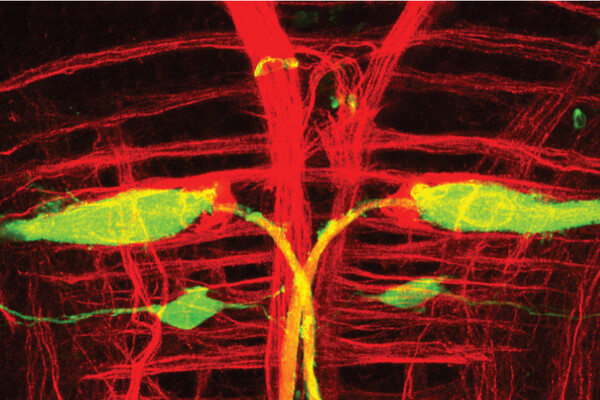5/18
Perelman School of Medicine
Penn Open Learning to Offer Updated Vaccine Course
By Julie McWilliams
Odds of Reversing ICU Patients' Prior Preferences to Forgo Life-Sustaining Therapies Vary Widely Across the U.S., according to Penn Study
Intensive care units across the United States vary widely in how they manage the care of patients who have set preexisting limits on life-sustaining therapies, such as authorizing do-not-resuscitate (DNR) orders and prohibiting interventions such as feeding tubes or dialysis, according to new research from the Perelman School of Medicine at the University of Pennsylvania. Their work is published in the current issue of JAMA Internal Medicine.
Most NFL Players with Injuries to the Midfoot Return to Game Action, Penn Medicine Study Finds
Nearly 93 percent of National Football League (NFL) athletes who sustained traumatic injuries to the midfoot returned to competition less than 15 months after injury and with no statistically significant decrease in performance, according to new research from the Perelman School of Medicine at the University of Pennsylvania. The findings, which focus on Lisfranc injuries – characterized by fracture of the midfoot bones and/or disruption of the midfoot ligaments – between 2000-2010, were presented today at the American Association of Orthopaedic Surgeons (AAOS) annual conference in Las Vegas.
Malnourished Patients are More Likely to Suffer Postoperative Complications than Morbidly Obese Patients Following Knee, Hip Replacement, Penn Study Finds
Malnourished patients are more likely to have complications following total knee or hip replacement surgeries than morbidly obese patients,according to new research from researchers at the Perelman School of Medicine at the University of Pennsylvania. The findings are being presented at the American Academy of Orthopaedic Surgeons Annual Meeting in Las Vegas March 24-28.
Penn Medicine Study: In Debated Surgical Procedure, Technique Trumps Technology
A team of orthopedic surgeons from the Perelman School of Medicine at the University of Pennsylvania has found that modern technology for healing distal femur fractures is as safe and effective as its more established alternative, without a potential shortfall of the older approach.
Roseroot Herb Shows Promise as Potential Depression Treatment Option, Penn Team Finds
Rhodiola rosea (R. rosea), or roseroot, may be a beneficial treatment option for major depressive disorder (MDD), according to results of a study in the journal Phytomedicine led by Jun J. Mao, MD, MSCE, associate professor of Family Medicine, Community Health and Epidemiology and colleagues at the Perelman School of Medicine of University of Pennsylvania.
Penn Medicine Experts Unveil Two New Ways to Identify Joint Replacement Patients at Risk for Post-Operative Complications
Orthopedic surgeons from the Perelman School of Medicine at the University of Pennsylvania have developed two new prediction tools aimed at identifying total hip and knee replacement patients who are at-risk of developing serious complications after surgery. The first tool identifies patients who have risk factors that should disqualify them from undergoing same-day (outpatient) or short-stay (overnight) total hip and knee replacement procedures, opting instead for traditional recovery pathways in the hospital.
New Penn Program Studies the Body’s Cells, One By One
By Sarah Welsh Cancer starts with a single cell going haywire. What is it about that one cell that makes it different from the rest, setting it on a path of destruction? A new program at the University of Pennsylvania may help find an answer to that and many other questions.
Penn Medicine Experts Offer Suggestions for Nudging Children toward Healthier Food Choices
Strategies aimed at reducing childhood obesity should acknowledge individuals’ rational taste preferences and apply insights from behavioral economics to design choice architecture that increases their likelihood of success, say two physician-scientists from the Perelman School of Medicine at the University of Pennsylvania and the Center for Health Incentives and Behavioral Economics in an editorial published in JAMA Pediatrics.
Penn Medicine: Genomewide Screen of Learning in Zebrafish Identifies Enzyme Important in Neural Circuit
Researchers at the Perelman School of Medicine at the University of Pennsylvaniadescribe the first set of genes important in learning in a zebrafish model in the journal Neuron this week. “Using an in-depth analysis of one of these genes, we have already revealed an important relevant signaling pathway,” says senior author Michael Granato, PhD, a professor of Cell and Developmental Biology. “The proteins in this pathway could provide new insights into the development of novel pharmacological targets.”
In the News
What’s going on with tranq?
Jeanmarie Perron of the Perelman School of Medicine says that the appearance and progression of skin ulcers and tissue loss on xylazine users is different than with other intravenous drugs.
FULL STORY →
It’s time to end the Medicare-Medicaid merry-go-round
In an opinion essay, Rachel M. Werner of the Leonard Davis Institute, Wharton School, and Perelman School of Medicine says that Medicare and Medicaid fail to integrate coverage and coordinate care across their two plans.
FULL STORY →
Inside Penn’s transfer center
Penn Medicine’s transfer command center gets patients from affiliated hospitals and hospitals outside Philadelphia to specialized care that can save lives, with comments from CEO Kevin Mahoney.
FULL STORY →
Operating rooms are major sources of greenhouse gasses. Penn is eliminating a form of anesthesia that hangs in the air for more than a decade after use
Penn Medicine is phasing out the anesthesia desflurane at four of its six hospitals to eliminate harmful greenhouse gases, with remarks from Greg Evans.
FULL STORY →
Broad Street runners from Penn are racing with gyroscopes to study the Achilles tendon
Casey Jo Humbyrd and Josh Baxter of the Perelman School of Medicine and colleagues will track data from running the Broad Street Run to understand how a healthy Achilles tendon functions.
FULL STORY →





